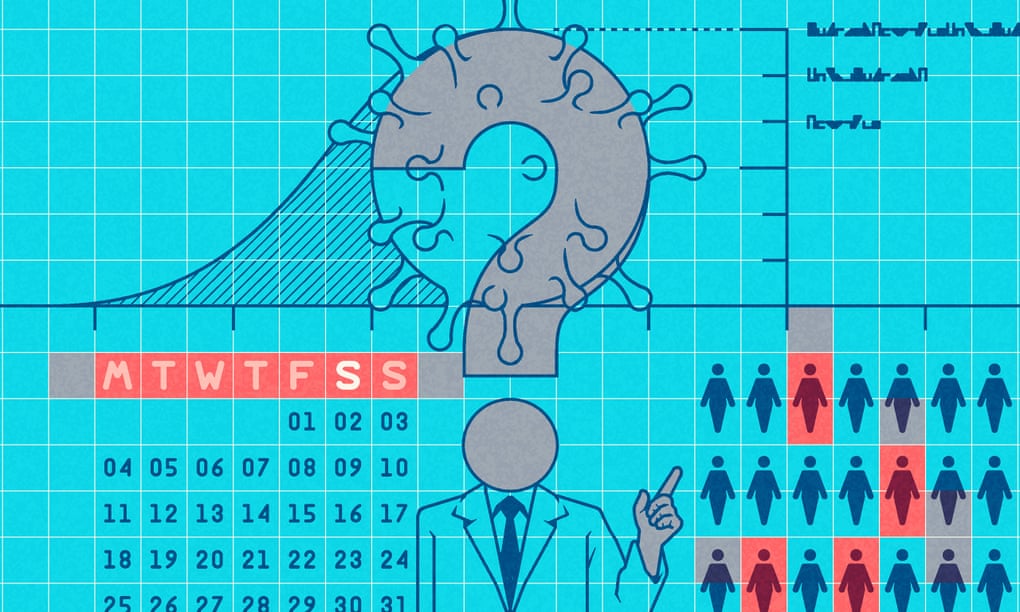Only a monumental effort of political imagination can end lockdown

The methods – whether it’s mass testing or contact-tracing – matter less than the huge shift in thinking that is required
ometimes you’re just asking the wrong question. On news programmes and at daily briefings, politicians across the world face versions of the same query again and again: when will the lockdown end? But that’s the wrong question.
Imagine a family has escaped a rampaging bear in the woods, seeking refuge in a log cabin. After sheltering there for days and weeks, they’re desperate to know when they can come out. But they wouldn’t simply be asking “When?” They would be asking “When will it be safe?” which is a different and tougher question, one whose answer would depend on several other questions: has the bear been tamed? If it hasn’t, do we have the weapons to destroy it or at least protect ourselves against it? And are those protections strong enough that we won’t have to rush back inside the cabin the moment we’ve ventured out?
We should be clear on one thing. Impatience to see an end to this mass, global quarantine is understandable. It’s not just boredom or lack of stamina that prompts it. There are people struggling to put food on the table; there are people whose mental health is faltering; there are people for whom a day stuck at home is a day stuck with a domestic abuser. For them lockdown is a jail sentence and they need it to end.
So of course it makes sense to long for an exit strategy. But it has to begin with an understanding of what lockdown is and what it is not. It’s tempting to see it as a solution: everyone stays at home, we “flatten the curve” and then, slowly and gradually, we lift the restrictions and return to normal. But that’s not how it is. Instead, lockdown is merely the crudest, bluntest instrument we could reach for when the coronavirus first struck. Its primary objective was to keep the number of people infected sufficiently low that the health service could cope. Judged by that standard, preventing, say, the NHS in Britain being overwhelmed, it has succeeded.
But essential though it was and is, lockdown could only ever be a first step. It enjoys remarkable support – still backed by 91% of Britons, according to a YouGov poll – but it was always going to be dropped the moment a better option became available. The ideal would be a vaccine, equivalent to removing the bear’s claws and teeth, but that, we are warned, is 18 months away at best. So what’s the other route out of hiding?
Read the expert plans, and they all come back to one thing. Sure, social distancing will have to endure, in one form or other, but the key will be the one identified by the World Health Organization at the start: testing, testing, testing.
And yet here, too, there is a misconception, and it is one of scale. So far, testing has been limited to those with symptoms and in hospital. But the Nobel laureate Paul Romer – admittedly his prize was for economics rather than epidemiology – has got a lot of attention for a plan that argues that for the economy, and human life, to return to anything like normality, testing will need to be conducted for millions of people, all the time. He imagines health workers being tested at the start of a shift; the same would go for care workers, pharmacists, police officers and bus drivers. You might add teachers and restaurant workers. Romer wouldn’t bother testing people who already have symptoms: they should be presumed positive and immediately self-isolate. It’s the “asymptomatic spreaders” you need to identify, stopping them in their tracks. The logic underpinning the plan is clear: there will be no point in reopening shops, pubs and restaurants if people feel too scared to visit them. As virologist Prof Nicolas Locker puts it, “You can’t lift the lockdown as long as you are not testing massively.”
Do the maths and the numbers are colossal: Romer estimates some 22m tests would be necessary every day in the US alone, the equivalent of testing every American once every two weeks. Consider that there’s still no sign that Matt Hancock will reach his goal of 100,000 tests a day in the UK, and you realise how many orders of magnitude stand between where we are now and where we would need to be.
The obstacles are huge and obvious, though Romer reckons he has answers for all of them. Shortage of swabs? Move to saliva tests instead. Shortage of the key chemicals known as “reagents”? The test kits that rely on them are not the only option. The sheer numbers of tests that would have to be produced? The world’s manufacturers could do it; it just requires the political will. Which, given that our lives depend on it, should be there.
If that seems daunting, there is another approach. It would still require testing – though not on the same scale – followed by contact tracing: finding all those who’d been in close proximity to someone who’d tested positive and isolating them. “Test, trace, isolate” also has logic on its side, but it, too, takes lots of money and people. It’s thought one contact-tracer is required for every four cases of infection.
That means using the hiatus of lockdown to recruit and train people now in the mechanics of contact tracing. With no leadership from the top – on Thursday Donald Trump effectively announced that the buck stops with the 50 states – the likes of Massachusetts are already assembling their own squads of contact-tracers. San Francisco is doing the same, deploying a combination of librarians and medical students. The UK government could follow their lead immediately, putting to work some of the thousands of people currently at home and itching to help. Tech can play a role, too: note this week’s announcement that Apple and Google will join forces to see if they can produce the app that will make tracing easier and faster, though the threat to privacy of such surveillance is obvious.
What specific methods are deployed matter less than the bigger shift that is required, which is one of imagination. Governments need to realise that what’s coming is not a decision about easing this or that rule of social distancing, but rather a massive political, industrial and collective drive unseen since the last war. It may well mean repurposing factories to mass-produce testing kits. At the very least, it should mean a dedicated cabinet minister for testing.
This demands a huge shift by the UK government, which wasn’t even testing people coming out of hospital and going into social care until this week. But nothing less will be enough. It’s not enough to flatten the curve; we have to get ahead of it. It’s true that we cannot stay in lockdown for ever. But we cannot leave until it’s safe – and that requires a monumental effort, starting right now.
• Jonathan Freedland is a Guardian columnist
In the midst of a global crisis…
… the truth is a powerful tool. The news has rarely been so relentless, so bewildering. Which is why we at the Guardian dedicate time for every story we publish to checking and double-checking what is true and what is not. With so much misinformation out there, this already-disorientating crisis can be difficult to navigate. As an independent news organisation, we make it our mission to deliver honest, unbiased, accurate journalism.
We believe every one of us deserves equal access to reliable news and explanation. So, unlike many others, we made a different choice: to keep Guardian journalism open for all, regardless of where they live or what they can afford to pay. This would not be possible without the generosity of readers, who now support our work from 180 countries around the world.
We have upheld our editorial independence in the face of the disintegration of traditional media – with social platforms giving rise to misinformation, the seemingly unstoppable rise of big tech and independent voices being squashed by commercial ownership. The Guardian’s independence means we can set our own agenda and voice our own opinions. Our journalism is free from commercial and political bias – never influenced by billionaire owners or shareholders. This makes us different. It means we can challenge the powerful without fear and give a voice to those less heard.
Your financial support has meant we can keep investigating, disentangling and interrogating. It has protected our independence, which has never been so critical. We are so grateful.
We need your support so we can keep delivering quality journalism that’s open and independent. And that is here for the long term. Every reader contribution, however big or small, is so valuable. Support the Guardian from as little as €1 – and it only takes a minute. Thank you.



 Creators of mankind
Creators of mankind Description of “Tall white aliens”
Description of “Tall white aliens” Where they came from?
Where they came from? About hostile civilizations
About hostile civilizations The war for the Earth
The war for the Earth “Tall white aliens” about eternal life
“Tall white aliens” about eternal life Video: “Nordic aliens”
Video: “Nordic aliens” Aliens
Aliens Alien encounters
Alien encounters The aliens base
The aliens base UFO
UFO Technology UFO
Technology UFO Underground civilization
Underground civilization Ancient alien artifacts
Ancient alien artifacts Military and UFO
Military and UFO Mysteries and hypotheses
Mysteries and hypotheses Scientific facts
Scientific facts


















